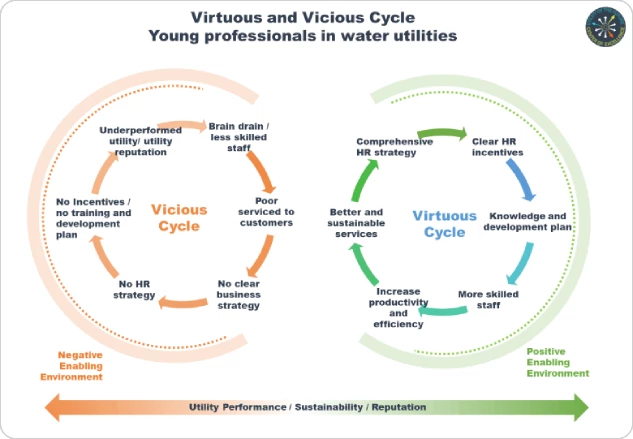 Sylvia Chileshe is a sub-station attendant at the switch yard near the Kariba Dam, the largest man-made reservoir in the world, which supplies water to two underground hydropower stations. Credit: Arne Hoel/World Bank.
Sylvia Chileshe is a sub-station attendant at the switch yard near the Kariba Dam, the largest man-made reservoir in the world, which supplies water to two underground hydropower stations. Credit: Arne Hoel/World Bank.
It’s time to confront a stark reality: The shortage of young professionals entering the water and sanitation workforce poses a dire threat to the sector's sustainability and future development.
Discussions about water and sanitation service provision are commonly dominated by professionals with significant experience in the field whose perspectives may be heavily influenced by traditional methods and historical approaches. Young professionals enrich these discussions with fresh ideas, innovative technologies, and forward-thinking strategies to advance the sector, and we need more of them.
Unpacking the challenges
The sector is already facing a professional gap that will be exacerbated by a significant segment of the workforce retiring within the next decade and an insufficient pipeline of young talent to replace them. This situation is critical, with many countries reporting a lack of comprehensive human resources strategies and an acute underrepresentation of women. The need for skilled professionals to navigate the complex challenges of water and sanitation management is urgent, yet the sector struggles to attract and retain the necessary talent, particularly among younger generations.
Attracting young talent, particularly women, to this sector is not easy. Societal stigmas, perceptions of a politized and corrupted sector, limited opportunities, misalignment between educational systems and workforce needs, reluctance of workers to serve in rural areas, and inadequate financial resources for hiring and retaining staff hinder filling professional gaps in water and sanitation.
From a focus group led by the Utility of the Future – Center of Excellence with young professionals from the Western Balkans, the World Bank team heard firsthand what the challenges are for young professionals who want to enter the sector.
Low wages and a perceived lack of training and development opportunities alongside advancements in AI are at the forefront of their concerns. Complementary research indicates that political barriers to entry; the undervaluation of work; and the lack of organizational visions that align with the values of a younger generation who particularly care for new technologies, the environment, and climate change, contribute to the sector's unattractiveness.
The classic "chicken or egg" dilemma persists, with entry-level positions demanding experience that candidates cannot obtain without first securing a job. Furthermore, young professionals often feel their perspectives are disregarded by the older generation, and the scarcity of online platforms complicates the job search process, adding another layer of difficulty to entering the sector workforce.
Identifying the solutions
Several strategies can be implemented to tackle the talent drought.
- Pairing seasoned professionals with new employees in structured mentorship programs can accelerate professional growth and foster a knowledge-sharing culture.
- Offering internships provides real-world experience.
- Tailoring programs for young professionals and offering competitive compensation enhances the attractiveness of the sector.
- Providing continuous development opportunities, from sponsoring professional certifications to encouraging attendance to conferences, can lead to better job performance and increased job satisfaction.
- Promoting work-life balance policies can make a workplace more attractive.
- Emphasizing gender equity and creating an inclusive organizational structure can diversify the workforce.
Externally, utilities that engage with the community and educational institutions raise awareness of water sector careers and help build a talent pipeline.
- Publicizing clear job descriptions, training programs, and career development pathways can significantly improve recruitment and retention.
- Conducting boot camps and offering scholarships can expand the talent pool.
- Participating in career fairs and running targeted marketing campaigns through modern communication channels will highlight the sector's importance.
- Emphasizing the technological advancements within the sector can attract the tech-savvy younger generation.
- Organizing sector events tailored to young professionals can foster interest in the water utility sector.

Leading by example
The Utility of the Future – Center of Excellence is taking the leap to “walk the talk,” with a series of pilot initiatives aimed at understanding first-hand the key challenges for young professionals in the sector and developing an evolving and adaptable strategy to attract and retain young talent. These activities include
- an open space for young people to interact organically and discuss main issues of interest,
- an accelerator program for professionals with limited experience to give opportunities to new talents with high potential, and
- a Young Professionals Innovation Challenge to trigger the development of new ideas and create awareness among young people about the relevance of water.
World Bank initiatives around young professionals will continue to evolve as we listen to the voices of young people, understanding the conditions of the water and sanitation sector and taking action to attract new talent.




Join the Conversation